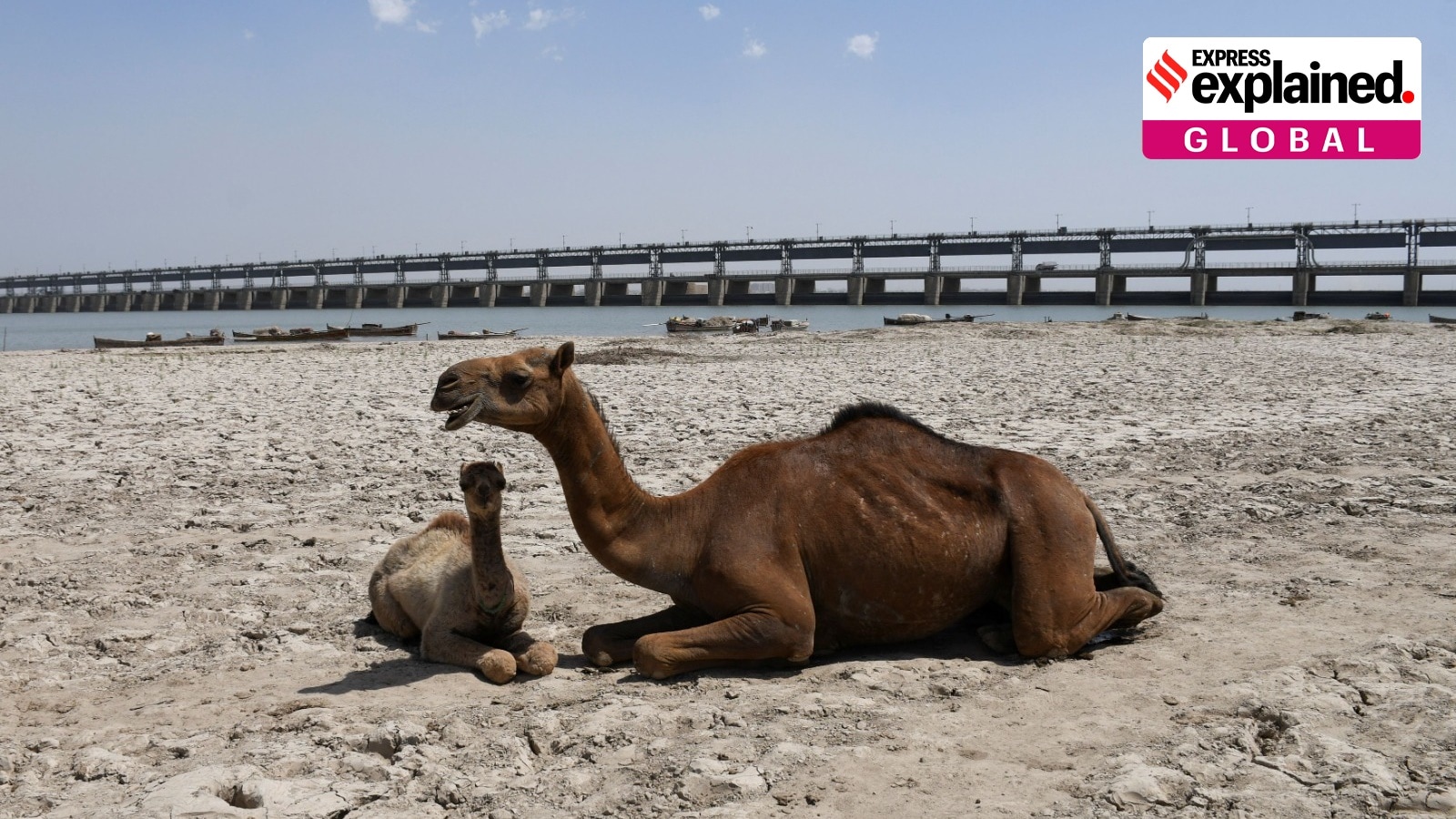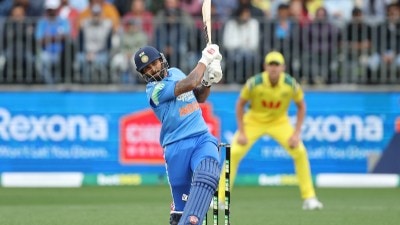Why Pakistan has put its ambitious canals project on hold
The project, meant to irrigate millions of acres of previously uncultivable land, triggered a political storm in Pakistan, revived old provincial rivalries, and fomented tensions within the ruling alliance
 Camels sit on the dry riverbed of the Indus River, with the Kotri Barrage in the background, in Jamshoro. Pakistan is dependent on the Indus and its tributaries for water, and the river system is very stressed. (Photo: Reuters)
Camels sit on the dry riverbed of the Indus River, with the Kotri Barrage in the background, in Jamshoro. Pakistan is dependent on the Indus and its tributaries for water, and the river system is very stressed. (Photo: Reuters)After weeks of protest in Sindh, the Pakistan government on Thursday (April 24) put its ambitious canals project on hold.
The project, meant to irrigate millions of acres of previously uncultivable land, triggered a political storm in Pakistan, revived old provincial rivalries, and fomented tensions within the ruling alliance of the Punjab-based Pakistan Muslim League (N) and the Sindh-based Peoples Party of Pakistan.
Green Pakistan Initiative
The canals project is the centrepiece of the larger $3.3 billion Green Pakistan Initiative (GPI), launched by Prime Minister Shebaz Sharif and army chief General Asim Munir in 2023.
Run by an army-owned private company, GPI seeks to “modernise” Pakistan’s agriculture sector by introducing new technologies, providing farmers high-quality inputs, and creating irrigation infrastructure. The ultimate goal is to increase yields, and bring new areas under cultivation.
“Revitalising agriculture is essential for the economy, particularly as Pakistan faces climate-related threats,” retired army general Shahid Nazir, who heads the GPI, told Al Jazeera.
In recent years, the crisis-ridden Pakistan has struggled with food shortages, forcing it to expend valuable foreign exchange to import foodstuff.
According to the Pakistan Bureau of Statistics, the country’s import of food commodities will once again cross the $9 billion mark in the FY 2025. (It has crossed $6 billion in July-March 2024-25, data released earlier this month show).
Six ‘strategic’ canals
In July 2024, President Asif Ali Zardari, also the co-chairman of the PPP, approved the construction of “six strategic canals” which he said were “vital for agricultural development and food security”.
The most significant among these — and also the most criticised — is a 176-km long canal meant to irrigate the arid lands of Cholistan in southern Punjab. Bordering the state of Rajasthan in India, Cholistan is a part of the larger Thar desert, and “faces significant challenges in meeting its total water requirements” according to a 2023 paper by the Pakistan Council of Research in Water Resources.
“The construction of the Cholistan Canal is therefore seen as a critical intervention to transform the region by bringing reliable and sustainable water supplies to large areas of previously uncultivable land,” according to the working paper prepared by the federal Ministry of Planning, Development and Special Initiatives, Al Jazeera reported.
To be built at an estimated cost of almost $800 million, upon completion, the Cholistan Canal will irrigate almost 5,000 sq km (1.2 million acres) of land, Dawn reported. Its construction began earlier this year, but has since been halted, according to reports from local media.
Sindh’s concerns
Officially, the Cholistan Canal was meant to be supplied entirely by flood water released by India on the Sutlej. However, according to data from Pakistan’s Ministry of Water Resources, in 2018-19, only 3.4% of the water (4.9 million acre feet) received by the country from the Indus and its five tributaries came from the three India-controlled “eastern rivers” — Sutlej, Beas, and Ravi.
As such, experts say that it is virtually impossible to supply the canal from the Sutlej alone. This raises a larger issue. Pakistan is dependent on the Indus and its tributaries for water. And the river system is already very stressed. Critics say the six new canals will exacerbate pre-existing water scarcity.
As a lower riparian province, this is of particular concern to Sindh. As one opinion article in The Nation put it, “…the federal government seeks to cultivate 1.2 million acres in Cholistan at the cost of jeopardising 18 million acres of Sindh’s land.”
Sindh is already a water-stressed province. The new canals will not only make things worse for its people, it will also starve the Indus delta, and thus hasten seawater intrusion and decimate fragile eco-systems, according to Dawn.
Old provincial rivalries
So when Punjab Chief Minister Maryam Nawaz, of the PML-N, and General Munir inaugurated the construction of the Cholistan Canal in February, the people of Sindh took to the streets in huge numbers. Student leader Muneer Hussain, leading a sit-in in Karachi, told The Nation: “… this issue is existential… it is the poor people who will suffer…”.
One reason why opposition to the canals project is so resonant among the people of Sindh is its larger historical gripe with Punjab.
Over the years, many have called Pakistan “Punjab-istan” owing to the dominance of Punjabis in all walks of life, from the military to its cricket team. All other states — Sindh, Balochistan, and Khyber-Pakhtunkhwa — have felt (or continue to feel) marginalised.
The canals project evokes larger anti-Punjab sentiments among the people of Sindh, who have historically felt hard done by upstream hydro projects in Punjab.
“Punjab’s own share of water is guaranteed through the existing system of canals. But when new irrigation areas are planned, without explaining where the water is coming from, it is inevitable that people in Sindh will express their anger and protest,” Naseer Memon, an Islamabad-based environmentalist, told Al Jazeera.
PPP in a pickle
Caught in the crossfire of the ongoing controversy is the PPP, the party which is in power in Sindh and whose support ostensibly keeps the government in Islamabad afloat.
That its initial response to the GPI bordered on an endorsement — indeed party co-chairman Zardari called the canals “vital” to Pakistan’s interests — and was not received well on the streets of Karachi. Various reports indicate that it was also not received well by the rank-and-file members of the party, as well as parts of its leadership in Sindh and beyond.
The PPP has since made a drastic u-turn. In recent weeks, there were even murmurs that the PPP and PML-N were headed for an immediate split, largely over the canals project and the protests it had triggered in Sindh. But that’s not what happened.
The decision to put the project on hold was announced by Shebaz with PPP co-chairman Bilawal Ali Bhutto-Zardari sitting next to him. Bilwal later said “as long as the PPP exists, not a single drop of Sindh’s water will be given away,” but added his party would “continue to work with the PML-N”.
As the canals project is deliberated further — the PM said it will be — people from Sindh remain wary. Indeed the strikes have not yet been called off, despite repeated requests from the Sindh Chief Minister, who belongs to the PPP.
If the project is reintroduced — perhaps with some modifications and more guarantees for Sindh, as some experts say is likely — it will be interesting to see how the PPP responds.
- 01
- 02
- 03
- 04
- 05






































